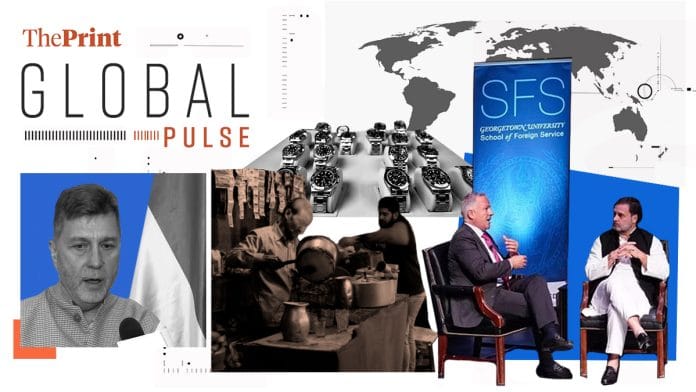New Delhi: Rahul Gandhi brought a different India to Washington this week, according to an opinion in the Financial Times, looking back at the Leader of the Opposition’s visit to the US, though not in an official capacity.
In the article, John Reed, FT’s South Asia bureau chief, contrasts Gandhi’s three-day visit to Texas and Washington with Prime Minister Narendra Modi’s state visits. “He (Gandhi) followed in Modi’s footsteps by meeting US politicians and diaspora Indians—but with the swagger of a man who suddenly believes he has a good shot at replacing him,” Reed writes.
Gandhi’s style is more “low key” and “business-like” than Modi’s, who “moves through India and the world in a whirl of pomp and ceremony,” Reed observes. His visit, Reed assesses, appeared to be a calculated push to signal to Washington that he is a credible future leader with his finger on the pulse of ordinary India.
While Gandhi’s meetings with senior US officials signal that Washington is keeping tabs on India’s shifting tides, the blowback to his visit and his comments—which include everything from memes to dismissal by both establishment politicians and media channels—shows his “continuing frailties” as a politician, the report says.
“Gandhi’s events have not matched Modi’s in scale or spectacle. But that is the point, party officials say,” Reed writes.
In a rare departure, Sam Pitroda, chair of the Indian Overseas Congress, offers FT a sharp insight: the difference between Modi and Gandhi is that he prioritises interactions, conversations, and dialogue. He’s not interested in hosting huge rallies where a preplanned message is broadcasted to tens of thousands of people—Gandhi and the Congress “want to learn”.
The Indian government, meanwhile, would benefit by shifting its focus from taking potshots at the LoP to how it can better cement its position on the world stage.
The Ukrainian ambassador in Delhi, Oleksandr Polishchuk, has a solution for India: to win a permanent seat on the United Nations Security Council (UNSC), India should play a more active role in ending the war in Ukraine.
The Bloomberg report, titled Ukraine Wants India to Play More Active Role to End Russia’s War, by journalist Sudhi Ranjan Sen, notes how India’s participation in mediating Russia’s war in Ukraine “has gained urgency” as Moscow targets power facilities as winter approaches.
“India is reliant on Russia for military weapons and cheap oil, and has refrained from condemning Vladimir Putin for his invasion of Ukraine two years ago,” the report notes.
The report also discusses India’s reluctance to play a more active role in the peace process, quoting Jaishanker’s remarks from earlier this week, when, in Germany, he said: “For us, this is not about a process or about being seen to do something… What is important for us is the reality of the conflict that is taking place today.”
According to the Ukrainian ambassador Oleksandr Polishchuk, India should stop playing a postman passing on messages and take on a more “robust role”, Bloomberg reports.
In the article India Has Become the Watch Industry’s Next Big Prize, The New York Times reports on rising Indian affluence through a deep dive into the market for expensive watches.
India has quietly emerged as a “lucrative frontier for Swiss watchmakers,” the report says, citing a Deloitte report from July. The watch industry in India, it seems, is another natural—yet unwitting—beneficiary of the China Plus One.
“While the vast majority of India’s 1.4 billion people make less than $1,000 a month, there is a significant slice of the population that can still afford five-and six-figure Swiss watches,” notes the report, written by writer and editor Victoria Gomelsky.
The report quotes none other than the chief executive of Cartier, Cyrille Vigneron, on how the relatively low cost of living allows people to buy luxury watches.
Historically, foreign luxury brands have faced many logistical challenges in conducting business in India. But a new free trade agreement signed in July between India and the European Free Trade Association—which comprises Switzerland, Iceland, Liechtenstein and Norway—has made watchmakers reconsider India as a destination.
The Indian fascination with luxury watches is also rising, the NYT reports. Just look no further for proof than the Ambani wedding—Anant Ambani’s numerous luxury watches were chronicled by a spate of paparazzi sites, including a video of him gifting each of his groomsmen a $180,000 Audemars Piguet Perpetual Calendar watch.
And while there’s no denying that Indians are obsessed with glamour and bling, foreign media also observes that there are more down-to-earth pastimes.
There’s an old South Indian joke that goes something like this: Malayalis seem to be everywhere on Earth and even when Lance Armstrong and Buzz Aldrin first stepped on the moon, they found a Malayali tea shop.
Nikkei Asia pays homage to these humble establishments in a lovely feature article on tea shops and how they serve as a convergence point for life and politics in India.
A tea shop is often a reporter’s first port of business, too. It’s the one place where the tea is always steaming, both literally and figuratively—everything from local gossip to political hot takes are doled out at tea shops.
From kadais in Tamil Nadu and tapris in Uttar Pradesh to thelas in Bengal, tea shops are ubiquitous public spaces across the country, notes journalist Meenakshi J. in the article titled How life and politics converge in India’s tea shops.
“In real life, tea kadai owners also play multiple roles as custodians of their customers’ secrets, serving as account keepers, and even as money lenders, becoming an integral part of many extended families,” she writes.
(Edited by Sanya Mathur)
Also Read: No mention of Harris’ Indian roots in debate & global media on ‘epidemic of cheating’ in India






